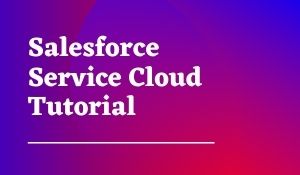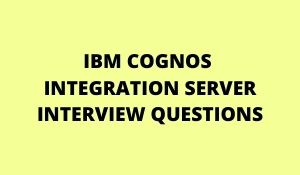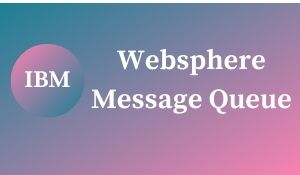
What is meant by Salesforce Service Cloud?
Salesforce Service Cloud is defined as the platform of customer relationship management (CRM) for customer support and service. Salesforce can be based on the Service Cloud on its popular CRM software, Sales Cloud product, for sales professionals.
Service Cloud ensures the customers to automate the service streamline workflows, processes, and find essential articles, and topics in order to support the agents of customer service. The main purpose is to foster one-to-one relationships of the marketing with each and every customer across various devices and channels.
Service Cloud can often “listen” and respond to the customers across many social platforms and can automatically route cases to the agent appropriately. Social customer service can be integrated with the Success Platform of the Salesforce Customer, which can be used to enable the social team and gather the comprehensive picture of the customer order to inform the various responses.
Services for the Applications will make it possible in order to embed the customer support software into various applications. In the application mobile support it can include live screen sharing, agent video chat, and assistance of on-screen guides. The software can also be integrated with the cloud of Salesforce Community, which can be used to provide many more communication channels for customers and agents.
According to Salesforce, the Service Cloud is considered as the world’s top-ranking platform for customer service.
Main benefits and features:
Salesforce lists nine various features for the platform of Service Cloud:
- Case management. Agents can be used it as the Service Console in order to juggle various cases at once across several channels. The Case management can be accessible through both desktop and mobile applications.
- Agent workspace. This will going to customize and comprehensive the user interface (UI) for the customer service agents such that it can offer several analytics, productivity tools, and customer views.
- Service process automation. It is used to support the functions which can be automated with the artificial intelligence (AI).
- Omnichannel routing. Leads and Cases can be directed automatically to the specific employees that are based on the factors such as employee availability and skill set. Supervisors can also be access the complete view of agent activity and routing.
- Knowledge management. Agents can also be created and have the access to the resources within the knowledge base of the organization.
- Computer telephony integration (CTI). The Service calls are made in order to to have the customers to manage within the customer information / data on hand.
- Service analytics. Dashboards can be used to give the employees an easy access in reporting the essential CRM data / informaton, like chatbot performance, backlog analysis, case history and volume, activity, and agent order management, and productivity Asset. These tracks are used for the customer data, such as order history, assets, and support history.
- Automation with macros. It is very much used for the Repetitive customer service tasks to get automated.

Some other features of Service Cloud are shown below:
- multiple languages
- Mobile application.
- customized reporting.
- Multichannel integration for platforms like facebook and massenger.
- Legacy systems integration
- Role-based permissions.
- Team collaboration systems
- Community Cloud integration
- Live agent web chats.
- Service entitlements.
- Service-level agreements (SLA)
- Tiers/free and Pricing trial
Salesforce Service Cloud often comes in four various different pricing tiers: Professional, Essentials, and Unlimited Enterprise.
- This tier can also be customizable for the CRM offerings for larger organizations / companies. This level cost can be of $150 per month.
- This level can be marketed towards the teams of small customer service. This option costs is almost $25 per month.
- This option may be a complete service CRM which has the capabilities and can have the cost of $75 per month.
- This has the maximum service tier that can be used to provide enterprise-level functionality along with some additional support options, unlimited tabs, sandbox testing, and and apps. This tier can cost up to $300 per month.
A free trial of features of the Service Cloud is completely a basic in availability. As per the Salesforce website, the free trial can be able to give the option to use the below functionality:
- Reports, dashboards and preconfigured processes.
- Uploaded or preloaded information / data.
- Resources of the online training with good experiences from the guides.

Sales Cloud and Service Cloud of Salesforce:
When the customers get enrolled with the products of Salesforce, then they will going to have the option in choosing between the Service Cloud and Sales Cloud of the modules. There is a considerable amount of overlap in between the two modules. The product of Sales Cloud can be used by the businesses which are more focused on opportunities, generating leads, and sales. However, the Salesforce Service Cloud contains all the features that Sales Cloud including additional features for the businesses of the service-oriented with good support process demands.
Benefits of Salesforce Service Cloud:
Service Cloud can often “listen” and respond to the customers across many social platforms and can automatically route cases to the agent appropriately. Social customer service can be integrated with the Success Platform of the Salesforce Customer, which can be used to enable the social team and gather the comprehensive picture of the customer order to inform the various responses.
Service Cloud ensures the customers to automate the service streamline workflows, processes, and find essential articles, and topics in order to support the agents of customer service. The main purpose is to foster one-to-one relationships of the marketing with each and every customer across various devices and channels.
Services for the Applications will make it possible in order to embed the customer support software into various applications. In the application mobile support it can include live screen sharing, agent video chat, and assistance of on-screen guides. The software can also be integrated with the cloud of Salesforce Community, which can be used to provide many more communication channels for customers and agents.
Conclusion:
Hope this article helps you to know the complete details about Salesforce service cloud. Still, you have any queries, comment in the below section. Happy Learning!










